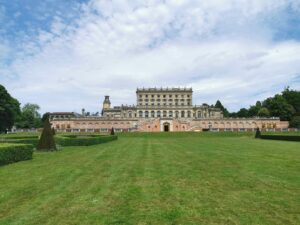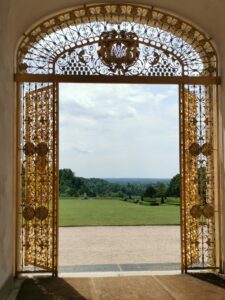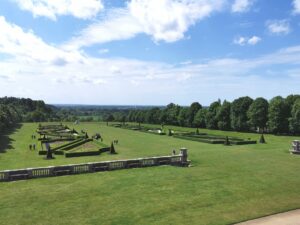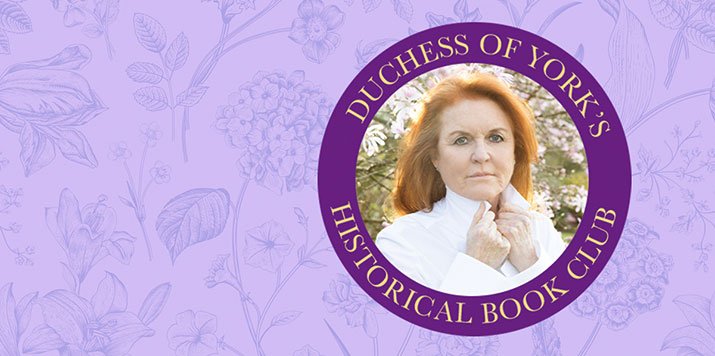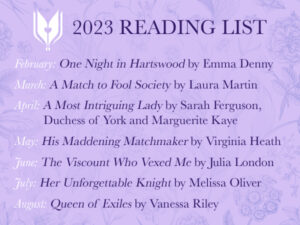As part of The Duchess of York’s Historical Book Club, we’re sharing more about the research that went into A Most Intriguing Lady. We’re thrilled to hand over the reigns of our blog to Sarah and Marguerite…
*
Sarah: Thank you to Mills & Boon for inviting us to chat about our latest collaborwriting, project A Most Intriguing Lady. Today Marguerite and I are going to share some insights into why we chose certain locations for our story, and how they helped to shape the plot.
Marguerite: That’s really important, isn’t it? It’s not only that the locations are characters in their own right, but it’s that the places we selected made us think about what we wanted to happen there, how our characters inhabit them. Shall we begin with Drumlanrig Palace?
Sarah: That seems the natural place to start since the Pink Palace, which will be familiar to some readers from the television adaptations of Outlander, is where our story opens and closes.
Marguerite: I seem to remember you had that dramatic opening scene in your mind almost from the moment we started to plot Lady Mary’s story.
Sarah: It’s strange but I did. I always thought of Lady Mary as a woman who hides her light under a bushel. Someone who lurks in the background, is constantly over-looked. I think I described her to you as a little dormouse – or that’s what people think of her. But our Lady Mary is also daring. There’s a side to her character that wants to show the world that they have no idea who she really is. She’s not an extrovert as such, but someone with a flamboyant side.
Marguerite: Which is where your typically left-field idea that we make her a tightrope walker comes in! I must admit I was a bit dubious, but when we looked into Victorian circuses of the time, we discovered that she could have come into contact with a member of a circus family, perhaps one who had ended up on the staff.
Sarah: Exactly, and the ever curious young Mary would have pestered them to show her the ropes, as it were.
Marguerite: (Groans) That’s terrible! But from the point of view of the story, the challenge was how best to show Mary demonstrating this skill, and we had to ask ourselves, under what circumstances? Then I visited Drumlanrig Palace in the Scottish Borders, which is one of Mary’s family homes – and I should say here, thank you to my sister Johanna and my mum for tagging along. And I sent you the photographs…
Sarah: …and I saw the narrow stone roof parapet, and the staircase leading down from the dining room to the gardens…
Marguerite: …and not only did we have a dramatic location for Lady Mary to perform her feat of derring-do, we had a wonderful perspective from the woodlands at the edge of the gardens for our hero to witness it.
Sarah: Yes! It was one of those truly exciting moments that happens while we are talking on the telephone, wasn’t it? When we both felt that Lady Mary was coming alive and literally walking onto the page, and that we were teetering out onto the parapet with her. Then of course, you brought us back down to earth and said, but why is she there?
Marguerite: I think it was you who thought of the banquet and the ceilidh, and then I remembered that Walter Scott was a relative, and in one of those wonderful co-incidences, it had been the centenary of his birth the year before. We had such fun with those scenes, didn’t we, using our joint experience of all things tartan, though it’s fair to say, you love that sort of thing and I am the exact opposite. It was you who kept us right on the etiquette as ever though. I had no idea it was so shocking for a person to leave the table during a banquet.
Sarah: Beyond shocking, which is one of the reasons I wanted Lady Mary to do it. From the very beginning, we wanted our readers to know that our heroine was a secret rebel.
Marguerite: Just returning to etiquette for a moment, perhaps you’d like to share a few more insights with readers on the subject. The fruit service discussion, for instance?
Sarah: I think we ended up deleting that scene in the end, sadly. But yes, I remember sending you lots of pictures of beautiful ornate dessert services, and the discussion about the importance of gold knives.
Marguerite: And I remember not long after that, visiting Brighton Palace where the table in the dining room was set up for dessert and getting ridiculously pleased with myself for recognising it.
Sarah: And before that, in our book, there were all the rules and regulations around the shooting party scenes. Who wore what. The lunch that was served on the moor. Oh yes, and the pecking order when it came to the allocation of shooting positions – and that was vital to our story, wasn’t it?
Marguerite: We had to bend the rules a bit to suit us on that one.
Sarah: Our heroine bends the rules rather a lot, and I love that aspect of her. Sneaking out in the early hours of the morning – oh, and that is another example of the location inspiring the plot, isn’t it? When I saw the picture of the beautiful, atmospheric summer house in the grounds at Drumlanrig, I was determined we would include it.
Marguerite: Which we did. And what is now known as the Duchess’s Garden, I remember you were entranced by that.
Sarah: I love walled gardens. I remember being equally determined to feature the walled garden at Powerscourt in Ireland, one of the locations in Her Heart for a Compass. Fortunately for us, it had already been built by the time we wanted to use it, but there were some other famous features in Powerscourt like the fountain that we couldn’t, as out story pre-dated it.
Marguerite: We were very lucky that Camilla, one of our researchers, had assistance from the Duke of Buccleuch’s archivist, and that the development of the gardens at Drumlanrig by Charlotte, Duchess of Buccleuch, was one of his passions.
Sarah: Charlotte was a formidable woman and a true philanthropist. It was discovering how much influence she had at Drumlanrig, the work she put into not only designing the gardens but working with her Head Gardener David Thomson that made us want to have her play more of a role in our story.
Marguerite: We were quite harsh on her in Her Heart for a Compass, but the more we learned of her the more we grew to understand her. She wasn’t a warm mother but she was very much a product of her time.
Sarah: She loved her children, and what I love about the character we gave her is that she learned from her experiences with Margaret. She wanted to be a better mother to Mary, but she didn’t know how. It was the discovery of the tragedy in her past – which I’m not going to share here because it would be a spoiler – that really made me empathise with her because it resonated with something in my own personal history.
Marguerite: I think it was also our coming to understand in contemporary terms that she must have suffered from ‘empty nest syndrome’ that made us want to explore her further. She had done her duty, produced a string of children who were all well-established – what now?
Sarah: A question which we are hoping to explore further in future books!
Marguerite: But meanwhile, back to the current book! Talking about Drumlanrig and the gardens, we had the exact same problem with Cliveden, didn’t we?
Sarah: Ah, Cliveden. That was the one location I was determined we would use. There’s such a wonderful history of intrigue and romance associated with that house, and I already knew from researching Queen Victoria that she had loved visiting there. Personally, I have spent so many happy times there too, I love the views from the gardens of the river, and all the little houses lining it. We simply had to feature Cliveden in our book.
Marguerite: It was your enthusiasm for it that inspired me to visit, for the first time with Susan, our other researcher in the autumn, and then in the summer with my Mum and sister Catriona. I could see immediately what you meant about the romance and mystery of the place.
Sarah: I was so upset when I discovered that the Fountain of Love was one of Lord Astor’s creations, and so dated after our book because it’s iconic, and the rooms as they are now, have very different uses from Lady Mary’s time. Fortunately the terrace and the views down to the river were already there.
Marguerite: And in another of those co-incidences that I love, I discovered that they were inspired by the landscape gardener Le Notre, of Versailles fame, who was also admired by the Duchess of Buccleuch and Lady Rolle, another of our characters.
Sarah: Aunt Louisa! I love Aunt Louisa. We wanted to have her home Bicton Park in the book, but unfortunately we simply ran out of words, didn’t we?
Marguerite: Talking of which, there are other significant locations we haven’t even mentioned, including Newburgh Priory and the crime-ridden Rookeries of the East End where Mary finds herself, but perhaps we should save that for another time.
Sarah: Good idea. Doesn’t time fly when you are enjoying yourself! But I hope we’ve whetted potential readers’ appetites to read A Most Intriguing Lady, to find out lots more. And perhaps even visit some of the locations for themselves.
*


